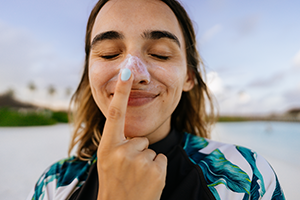
Skin Cancer is the most common cancer diagnosed today. In fact, in the United States, skin cancer makes up over 50% of all new cancers. Another important fact is that anyone can get skin cancer! A common misconception is that only fair-skinned individuals can get skin cancer. While it is true that it is more common among people with a light (fair) skin tone, skin cancer can affect ALL skin colors. Also, skin cancer affects both men and women.1
The statistics for skin cancer are as follows:2
- 1 in 5 Americans will develop skin cancer by the age of 70
- Having 5 or more sunburns doubles your risk for melanoma
- Each year, there are more than 3 million cases of skin cancer
- More than 2 people die of skin cancer in the United States every hour
Dr. Rebecca Baxt, a board-certified dermatologist, encourages everyone to get screened annually because the good news is that when detected early, the 5-year survival rate for melanoma is 99%!
What Are The Main Types Of Skin Cancer?
There are three main forms of skin cancer:
- Basal Cell Carcinoma and Squamous Cell Carcinoma are often found on skin that has been exposed to the sun (face, neck, and arms), though other areas of the body can also be affected. Both Basal and Squamous Cell Carcinoma are very common and can be treated.
- Malignant Melanoma is less common than basal and squamous cell cancer, but it is the most dangerous form of skin cancer because it is fast-acting. The cancerous growth leads the skin cells to multiply quickly and form malignant tumors. Melanomas often resemble moles and some melanoma develops from moles. Melanoma is a serious disease that requires early diagnosis and treatment.
These types of skin cancer are related to the sun (UVA/UVB rays), sun tanning beds, and genetics as skin cancer can be genetically based.
What Are The Risk Factors Associated With Skin Cancer?
Results may vary on different patients.
Dr. Rebecca Baxt explains to patients that everyone is at risk for developing skin cancer, while some people are at a higher risk. The common risk factors that increase your risk for developing melanoma include:
How Does Skin Cancer Typically Look On The Skin?
Each type of skin cancer looks differently on the skin. Also, skin cancer in people with darker skin color looks different than fair-skinned people. Typically, you should look for the following possible warning signs:
- A thick and jagged scar.
- A dark (or black) bump.
- A bump that may seem waxy or shiny.
- A lump that may look like a smooth, waxy bump or a firm red lump.
Learn The ABCDEs Of Melanoma
Asymmetry- When you draw a line down the middle of the mole, it is not symmetric, the sides do not match.
B order irregularities- The edges of the mole are irregular in shape and not smooth and even.
Color variation- Melanoma lesions may be black, red, white, blue, different colors, or various shades of brown. The color is not uniform.
Diameter- Larger than the size of a standard pencil eraser is more worrisome, but skin cancers can be tiny.
Evolving-changing. If the spot is changing in any way (e.g., itchy, growth, bleeding, changing size shape or color) that is a warning sign for melanoma.
If you are worried about any changes on your skin that do not resolve within one month, schedule a skin examination with Dr. Rebecca Baxt, a board-certified dermatologist. You can email our office or call us to request an appointment.
Prevention & Early Detection Is Key!

At BAXT CosMedical® we offer our patients a full skin cancer screening on a yearly basis, or more often for those at high risk. We see many patients with skin cancer.
The most important aspect of skin cancer treatment is prevention and early detection since most skin cancers are curable if caught early and treated.
Early detection requires good self-examination of the skin as well as yearly or more frequent examinations by a dermatologist. We also treat pre-cancers before they become skin cancers with Photodynamic Therapy (PDT).
Skincare Protection Tips
Prevention requires sun avoidance and wearing sunscreen or sunblock on a routine basis.
At BAXT CosMedical® we offer an excellent selection of the best sunscreens and sun blocks available at our office for every skin type, including acne and rosacea prone skin, sensitive skin, and for those with eczema.
We look forward to helping you keep your skin healthy and beautiful.
Read Dr. Baxt’s Blogs
- May Is Skin Cancer Awareness Month, Get Screened Today!
- Skin Cancer Awareness: The Truth Behind this Disease
1 cancer.gov, 2016 April, Anyone Can Get Cancer, NIH National Cancer Institute https://www.cancer.gov/types/skin/anyone-can-get-skin-cancer
2 Skincancer.org, 2022 January, Skin Cancer Facts & Statistics, Skin Cancer Foundation, https://www.skincancer.org/skin-cancer-information/skin-cancer-facts/


